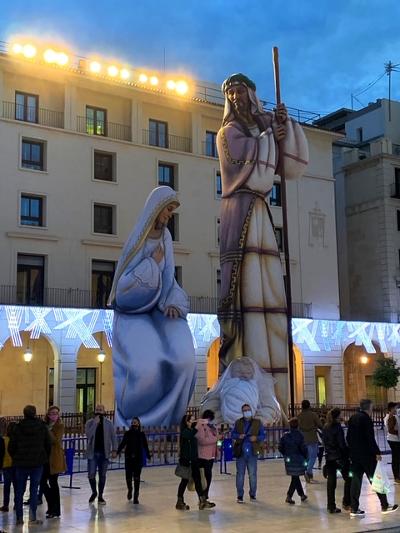The Christmas holiday is nearly here but without doubt a very different Christmas wherever we may be, bringing with it a range of complicated restrictions that are hard to keep up with. This scene from a Spanish town hall square sums this up with everyone except the giant figures required to wear a face mask, which this time last year we could not have imagined.

As I had feared and anticipated in previous blogs, the most recent lockdown in England has already started to bring out the “Why do we need libraries?” argument. The council leader in a West Midlands authority, the only one in the region not to have operated a library service during the lockdown or even to reopen them when it ended on 2 December, is now quoted as saying, “I’m a firm believer that if we haven’t used something for the past four or five months, do we really need it?” Apart from the obvious retort, “How can people use something that isn’t open?” I can think of all manner of facetious comments about other things we’ve foregone during this year of Covid, which doesn’t mean we don’t still want to enjoy them as soon as we can!
I’ve also recently come across an authority that is charging for its Click and Collect service. Frankly, I question the legality of this since, though the 1964 Public Libraries & Museums Act permits a charge for reserving an item, it didn’t foresee this being the only service on offer. But this is just one example that harks back to the comments in my November blog about the ongoing enforcement of a comprehensive and efficient, and basically free, public library service. DCMS, are you watching all this and ready if necessary to take action?
However, moving away from the negative, the end of a year and the start of a new one is traditionally a time to look forward. So, if we couldn’t have imagined the world as it is now with Covid-19, not least the impact this has had on the delivery of public library services, perhaps this thought invites us to engage in some blue sky thinking and see 2021 as offering the possibility to redefine the role of a library service and how it will be delivered?
At Activist we’ve been looking at how recent events could not only offer challenges to library services, but also opportunities. Going back to basics, every local authority has in place a Vision or Strategy for their library service for the next two, five or even ten years; some of these freshly done and imaginative, others perhaps looking rather tired. But how relevant will even the best of these be in a post-Covid world? To throw out just a few questions:
- Should our starting point really be the network of library buildings that we have, many designed for a past age and in locations reflecting patterns of life that have vastly changed?
- Or should we be talking about library services, not libraries? As we’ve just seen, ‘Library’ in everyone’s mind, not least local authority elected members and executives, means a building in a location, with associated costs, being visited less every year, which hasn’t been fully open for a good part of the past year!
- And as local authorities prepare their recovery plans and review key objectives, should we be asking how library services could assertively reposition themselves at the centre of those conversations?
It seems to me that the big lessons of the last nine months are: the huge potential of e-materials and the online delivery of many aspects of a library service; that nevertheless people still value being able to visit a safe community space for a variety of reasons including, daringly, to borrow a physical book; and that the libraries workforce has wide-ranging and often untapped skills. Might an enlightened local authority now realise that if it were to look beyond departmental structures, putting a ‘library offer’ into the mix with a range of other service components, this could offer the best and most cost-effective way to deliver its core objectives?
I’m interested in feedback on all this: maybe like me you like to dream a little? Maybe you think this just isn’t realistic? It would be progress if this conversation could at least begin in local authority management boards and service teams.
Just to prove that ‘dreaming’ can sometimes result in an amazing reality, take a look at Do Space in Omaha, Nebraska whose strapline is “There is no limit to what you can do”. As well as their own website, this review tells you more about the exciting concept. You’ll see that visiting Do Space you could: Use a computer; Experiment and learn; Check out tech; Interact with family; Use the printer; Engage with community … which sounds a lot to me like the UK public library offer, except that Do Space has no physical books. Turning ‘free use’ on its head “Most services at Do Space are offered free of charge to members … There is a nominal cost for printed materials”. I am not suggesting UK libraries abandon the loan of books, but should aspects of this model open up our thinking?
To wind up this blog for 2020, here’s something quirky: Not to be sniffed at is “an historical smells project”. Everything from the C16 belief that the scent of Rosemary could ward off the plague, to the stench of Waterloo. And if you’re contemplating a career change, yes ‘Smell Historian’ is a job!
Best wishes to everyone for the holiday break and for a brighter year to come!
Geoff Allen is a senior associate consultant with Activist Group. The views expressed in this blog are his own and do not necessarily reflect the opinions of Activist.
